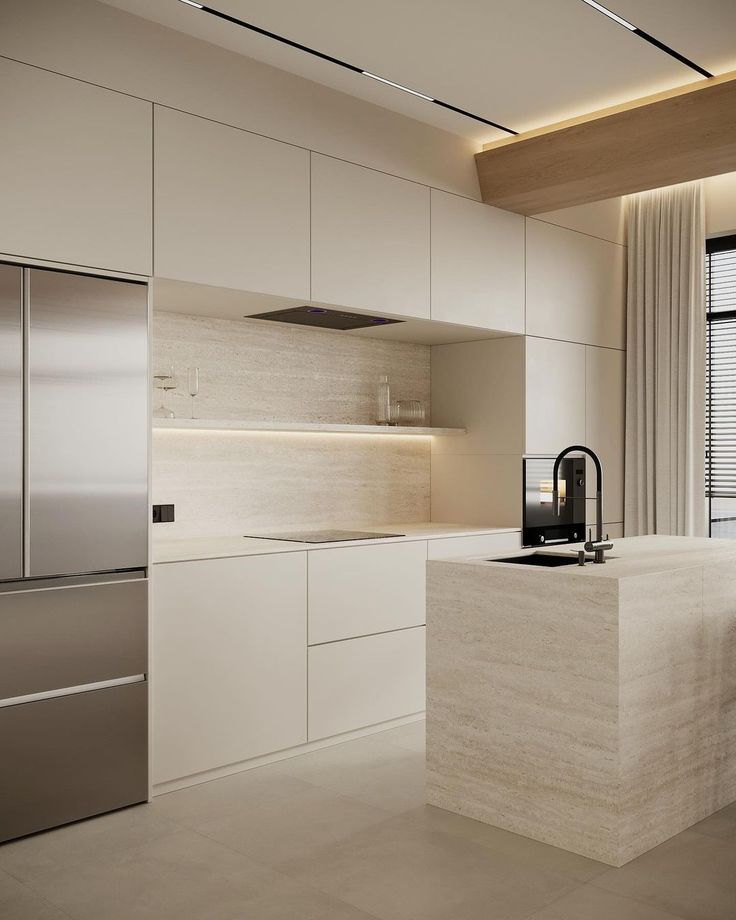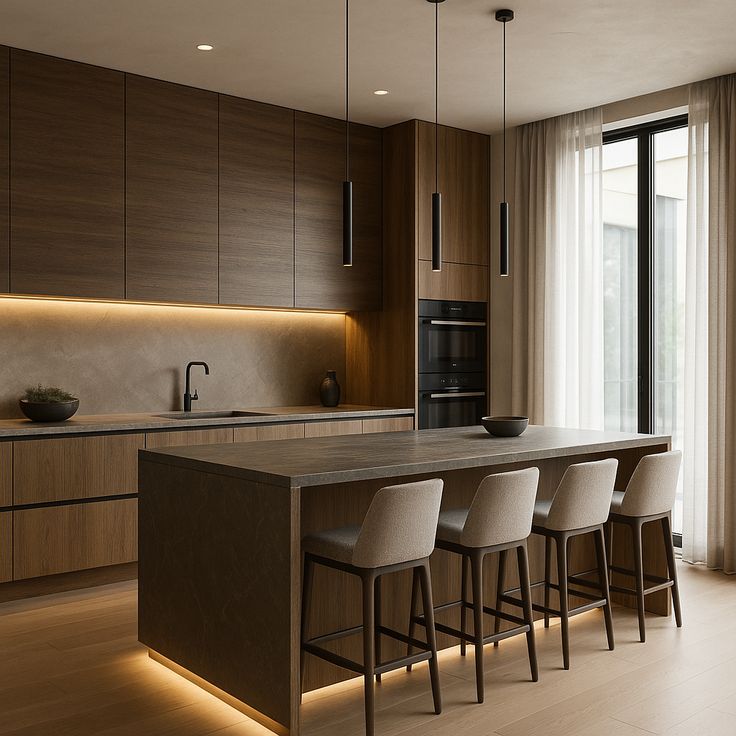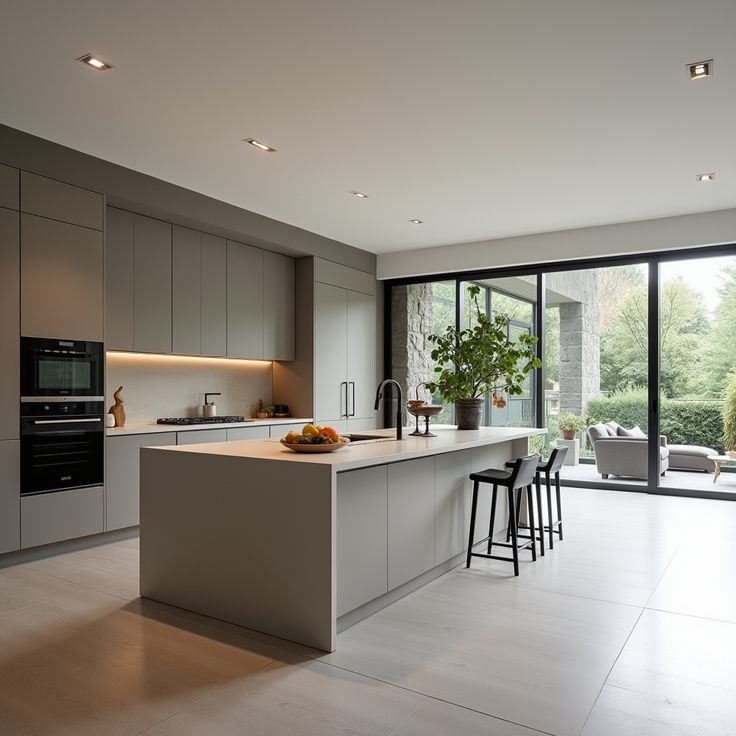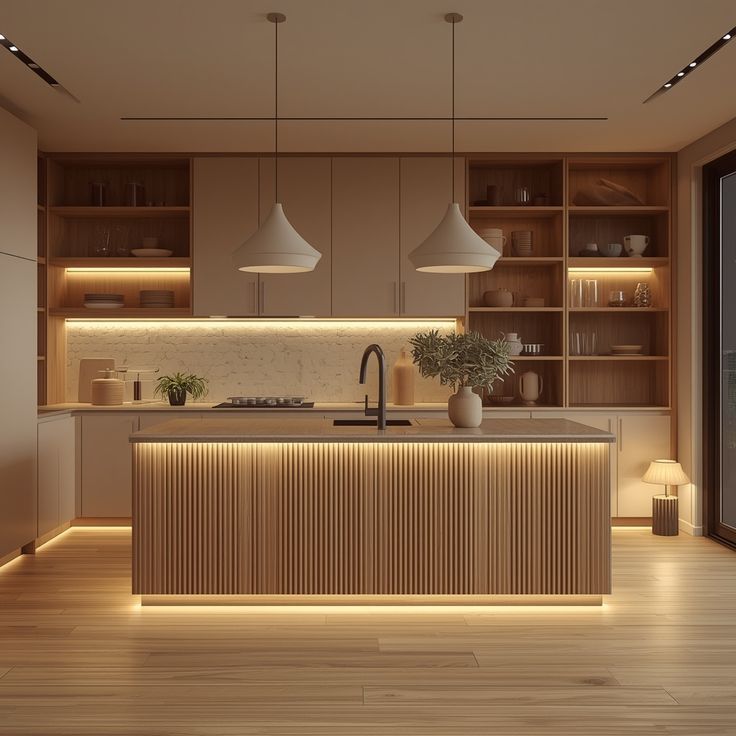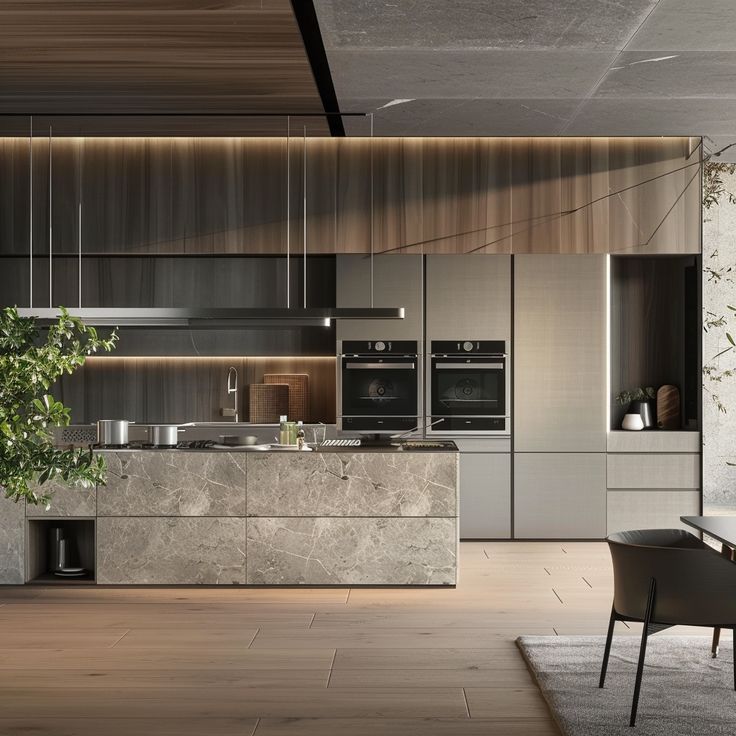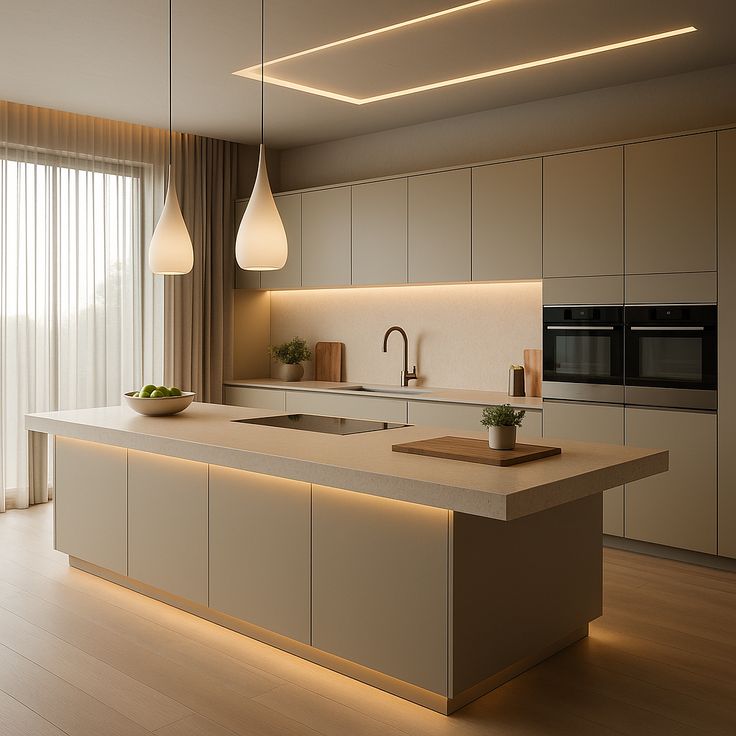Total Cabinetry And Joinery Solution
ENG

Choosing the right kitchen cabinet material is one of the most important decisions in any kitchen renovation or construction project. The material you select determines not only the look and style of your cabinets but also their durability, maintenance needs, and overall cost. With so many options available, it can be difficult to decide which one suits your lifestyle and budget best. In this guide, we explore 10 popular kitchen cabinet materials, along with their pros, cons, and best-use cases, to help you make the right choice.
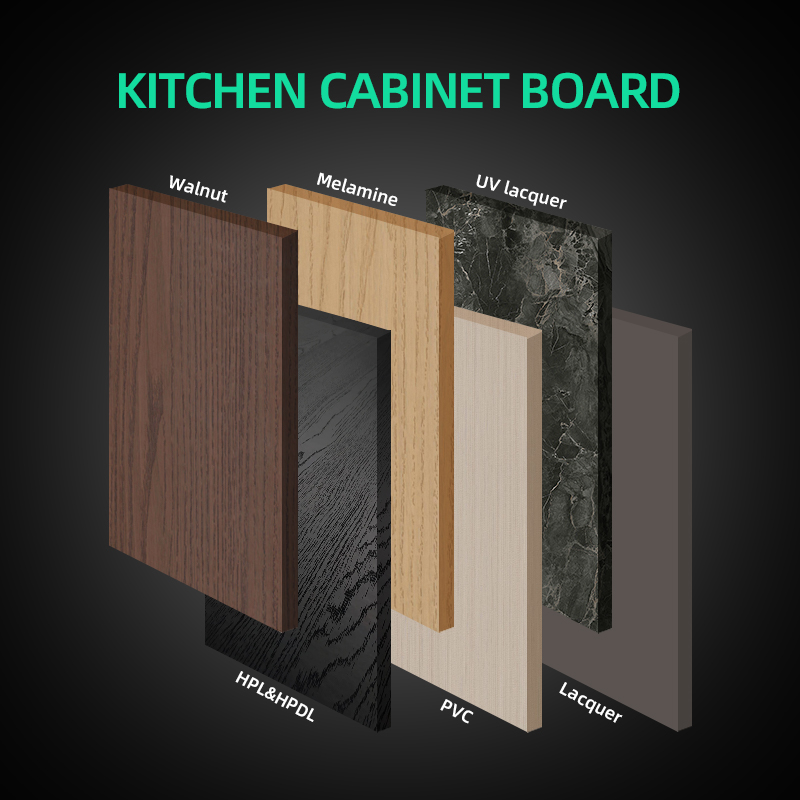
Overview:
Particleboard, also known as chipboard, is one of the most widely used Kitchen Cabinet Materials in budget-friendly manufacturing. It is made by compressing wood chips, sawdust, and resin under high pressure to form flat sheets. The surface is usually finished with melamine, laminate, or veneer to improve appearance and durability.
Pros:
1、Highly affordable, making it ideal for entry-level kitchen cabinets and large-scale housing projects.
2、Lightweight construction, easy to transport and assemble.
3、Smooth surface, ideal for applying melamine, PVC, and laminate finishes.
4、Consistent density, reducing the risk of surface warping or wood knots.
Cons:
1、Lower durability compared to plywood or MDF, especially in long-term use.
2、Highly moisture-sensitive—unsealed edges can swell or crumble if exposed to water.
3、Weak screw-holding capacity, which may affect cabinet longevity if frequently opened.
4、Not suitable for heavy countertop support without reinforcement.
Best For:
1、Budget-conscious kitchen projects where low cost is the main priority.
2、Rental apartments and temporary housing, where long-term durability is less important.
3、Mass production, including prefabricated or flat-pack kitchen cabinet systems.
4、Melamine-finished cabinets designed for modern, simple layouts.
Expert Tip:
If you choose particleboard among your Kitchen Cabinet Materials, ensure edges are sealed properly and avoid placement near wet areas like sinks unless water-resistant variants (e.g., high-density chipboard) are used.
Overview:
Plywood is a high-performance engineered wood made by bonding multiple thin layers of wood veneer (also known as plies) together with adhesive under high pressure. The grain direction of each layer is alternated (cross-grain structure), giving plywood exceptional strength, dimensional stability, and resistance to warping. It is widely regarded as one of the most reliable Kitchen Cabinet Materials for both residential and commercial projects.
Pros:
1、Strong & Durable: The cross-layered structure provides superior load-bearing capacity and structural integrity, making it ideal for cabinet carcasses and shelving.
2、Moisture-Resistant (E0/E1 Grades): High-quality plywood with low-formaldehyde emissions (E0/E1) performs well in humid environments, reducing the risk of swelling or deformation.
3、Dimensional Stability: Less likely to crack, warp, or shrink compared to solid wood or particleboard.
4、Suitable for Veneer or Laminate Finishes: Can be easily paired with materials like HPL, melamine, or wood veneer for various design aesthetics.
5、Long Lifespan: With proper sealing and finishing, plywood cabinets can last for many years, making them a reliable choice among Kitchen Cabinet Materials.
Cons:
1、Higher Cost than Particleboard or MDF: Good-quality plywood (especially E0/E1 moisture-resistant grades) is more expensive.
2、Edges Require Finishing: Exposed edges need to be covered with edge banding or veneer for a refined look.
3、Quality Varies: Lower-grade plywood can have internal gaps, reducing strength and durability if not sourced carefully.
Best For:
1、Homes in humid or coastal climates where moisture resistance is essential
2、Rental properties or investment homes aiming for better durability
3、Customers who want a strong, stable core material for their Kitchen Cabinet Materials
4、Commercial kitchens and heavy-use environments
As one of the most balanced Kitchen Cabinet Materials, plywood offers an ideal combination of durability, moisture resistance, and long-term value, making it a popular choice for modern cabinetry projects.Mid-to-high-end kitchen projects seeking long-lasting materials
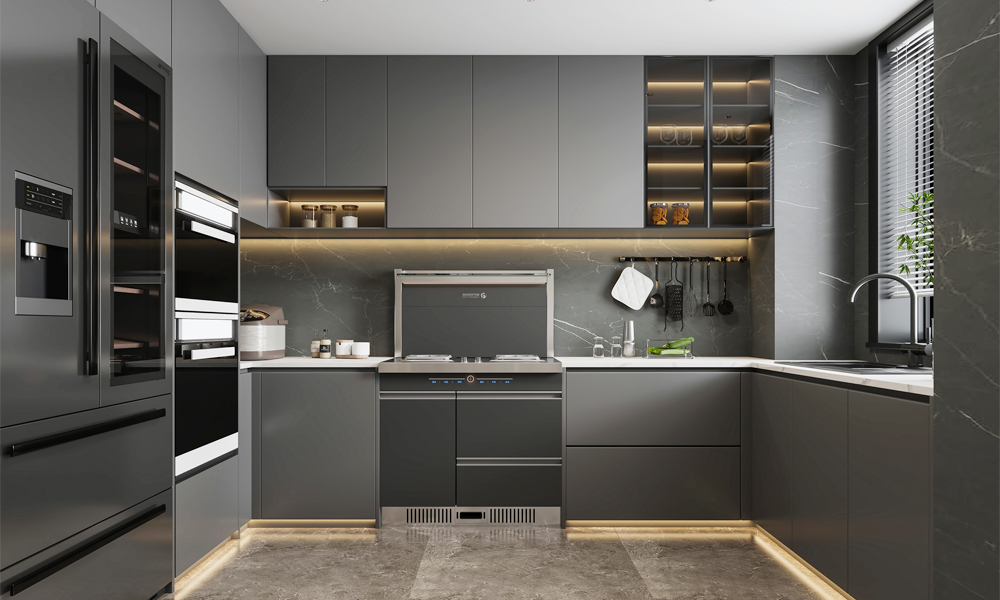
Overview:
Solid wood refers to natural timber sourced from species such as oak, maple, walnut, cherry, birch, and ash. As one of the most premium Kitchen Cabinet Materials, it delivers unmatched authenticity, texture, and craftsmanship. Each piece of wood features unique grain patterns, giving every cabinet a distinct and luxurious character.
Pros:
1、Premium & Authentic Appearance: The natural grain, knots, and textures create a truly upscale and timeless kitchen atmosphere.
2、Highly Durable & Long-Lasting: When properly maintained, solid wood cabinets can last for decades and even be refinished multiple times.
3、Customizable Finishes: Can be stained, painted, or treated to match various interior design styles, from farmhouse to luxury modern.
4、Strong Structural Integrity: Provides superior strength for cabinet doors, frames, and decorative elements.
Cons:
1、High Cost: One of the most expensive Kitchen Cabinet Materials, often used in high-end or luxury projects.
2、Sensitive to Humidity: Solid wood can expand, shrink, or warp due to temperature and moisture fluctuations, requiring stable indoor conditions.
3、Heavier Weight: Requires strong hinges and hardware, which may increase overall project cost.
4、Maintenance Required: May need periodic resealing, polishing, or refinishing to retain beauty and prevent moisture damage.
Best For:
1、Luxury homes and premium villa projects
2、Traditional, rustic, farmhouse, or high-end classic kitchen designs
3、Customers who value natural materials and craftsmanship
4、Projects where long-term durability and refinishing options are important
Among all Kitchen Cabinet Materials, solid wood stands out for its natural beauty and premium feel. However, it works best for clients with a higher budget and controlled environmental conditions.
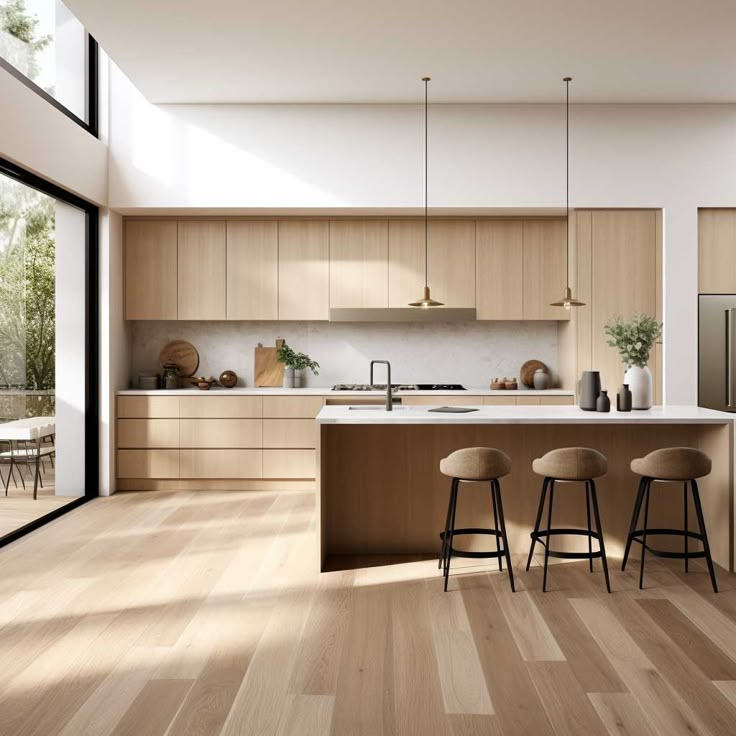
Overview:
MDF is an engineered wood product made from wood fibers bonded with resin under high temperature and pressure. It features a smooth surface and is highly workable, making it a popular choice among Kitchen Cabinet Materials, especially for modern-style cabinet doors.
Pros:
1、Smooth and Paint-Ready Surface: Ideal for painted or lacquered finishes, delivering a seamless and sleek modern look.
2、Easy to Machine and Customize: Can be easily molded, routed, and shaped—perfect for designs like Shaker doors or decorative profiles.
3、Affordable Alternative to Solid Wood: Offers a similar visual appeal at a more budget-friendly price.
Cons:
1、Moisture Sensitive: Standard MDF can swell or warp when exposed to humidity, making it less suitable for damp environments unless moisture-resistant grades are used.
2、Heavier Weight: Higher density than particleboard, which may require stronger hinges and hardware.
3、Lower Structural Strength Compared to Plywood: Not recommended for heavy load-bearing components such as cabinet carcasses or wall units.
Best For:
1、Modern or minimalist kitchen designs
2、Painted or lacquered cabinet doors
3、Shaker-style or routed door profiles
4、Mid-range projects needing a refined appearance without solid wood costs
If you’re comparing different Kitchen Cabinet Materials and looking for something that offers design flexibility with a smooth finish, MDF is a great mid-range option. However, for humid environments, moisture-resistant MDF or plywood may be a safer choice.
Overview:
Melamine board is a widely used material in the cabinetry industry, made by applying melamine resin-impregnated decorative paper onto a particleboard or MDF core using high heat and pressure. It is one of the most popular Kitchen Cabinet Materials for cost-effective and stylish cabinet doors, carcasses, and shelves. With its wide range of finishes—matte, gloss, wood grain, stone look, concrete style, or solid colors—it is frequently chosen for modern and minimalist kitchen aesthetics.
Pros:
1、Affordable & Budget-Friendly: Offers a stylish appearance at a lower cost compared to solid wood or high-end lacquer finishes.
2、Wide Range of Colors & Designs: Available in numerous textures, including wood grain, metallic, marble, and solid finishes, making it versatile for different kitchen themes.
3、Scratch & Stain Resistant: The melamine surface is hard and dense, offering resistance to scratches, markings, and most everyday stains.
4、Low Maintenance: Easy to clean with just a damp cloth, making it ideal for busy households.
5、Consistent Quality: Manufactured in uniform sheets, ensuring consistency in color, thickness, and finish—important for mass production.
Cons:
1、Limited Water Resistance: If exposed to excessive moisture, especially through unsealed edges, the particleboard or MDF core may swell or warp.
2、Edges Require Proper Sealing: Unprotected edges must be finished with edge banding to ensure durability and prevent peeling or water ingress.
3、Not as Strong as Plywood: Melamine board may have lower structural strength compared to plywood or high-density fiberboard (HDF), especially in heavy-load applications.
Best For:
1、Modern and contemporary kitchen designs seeking clean, sleek aesthetics
2、Budget-friendly residential or rental kitchen projects
3、Modular kitchens and large-volume production
4、Homeowners wanting a stylish yet low-maintenance finish among Kitchen Cabinet Materials
5、Commercial cabinetry (offices, apartments, retail) due to design versatility
As one of the most cost-effective Kitchen Cabinet Materials, melamine board provides an excellent balance of style, durability, and affordability—ideal for homeowners who want a modern look without a premium price tag.
Overview:
PET is a durable plastic film that is laminated onto MDF or particleboard under heat and pressure. Known for its eco-friendly composition, PET is fully recyclable and often preferred in modern sustainable kitchen concepts. It is especially common in contemporary and minimalist Kitchen Cabinet Materials, delivering a smooth, seamless surface in high-gloss or matte finishes.
Pros:
1、Glossy or Soft-Matte Finish: Offers a premium, mirror-like appearance in gloss or a velvety smooth texture in matte versions.
2、Fingerprint & Stain Resistant: Advanced PET films often include an anti-fingerprint coating, making them easier to clean.
3、Eco-Friendly & Non-Toxic: PET is recyclable and low in VOC emissions, making it a preferred choice for homeowners focused on sustainability.
4、Color Stability: PET maintains its color over time and resists fading from light exposure.
5、Smooth Edges: PET doors feature seamless edge-banding or post-forming for a refined, high-end look.
Cons:
1、Higher Cost Than Melamine: Slightly more expensive due to premium aesthetics and eco-friendly material.
2、Limited Repairability: Scratches or dents on the surface are difficult to repair compared to painted or lacquered finishes.
3、Heat Sensitivity: Prolonged exposure to high heat may cause warping unless properly manufactured using heat-resistant PET.
Best For:
1、Contemporary and modern glossy kitchens seeking a clean, reflective surface
2、Eco-conscious consumers looking for sustainable Kitchen Cabinet Materials
3、Minimalist or Scandinavian-style designs requiring smooth and uniform finishes
4、High-end modular kitchens with sleek aesthetics
5、Urban apartments and premium rental units wanting a sophisticated yet durable surface
Among the modern Kitchen Cabinet Materials, PET is an ideal option for homeowners who value a stylish, environmentally responsible, and low-maintenance cabinet finish.
Overview:
UV lacquered board is typically crafted from MDF or plywood coated with UV-cured lacquer, which is hardened using ultraviolet light. This process gives the board a high-gloss, mirror-like finish while enhancing durability. As one of the most visually impactful Kitchen Cabinet Materials, UV lacquered panels are widely used in modern and high-end kitchen designs where a sleek, polished appearance is essential.
Pros:
1、High Gloss Finish: Provides a reflective, glass-like surface that enhances brightness and makes kitchens feel more spacious.
2、Scratch & Wear Resistance: UV curing creates a tough outer layer that is more resistant to daily wear compared to traditional paint finishes.
3、Vibrant Color Options: Available in bold, rich, and customizable colors, ideal for contemporary interiors.
4、Eco-Friendly Coating: UV-curing reduces VOC emissions, making it a more environmentally friendly option than some conventional paints.
5、Easy to Clean: Smooth surface allows stains and spills to be wiped away effortlessly.
Cons:
1、Fingerprints & Smudges: High-gloss surfaces may show fingerprints or oil marks, especially in darker colors.
2、Edge Vulnerability: If edges are not properly sealed or banded, they may be prone to chipping or peeling over time.
3、Less Heat Resistant Than PET or Acrylic: Must be installed away from high heat zones unless additional protection is provided.
Best For:
Modern and minimalist kitchen designs seeking a sleek, glossy aesthetic
1、Premium kitchen cabinet materials in contemporary apartments or high-end homes
2、Show kitchen displays where visual appeal is a priority
3、Open-concept kitchens where reflective surfaces enhance lighting and create visual impact
UV lacquered boards are a top choice among Kitchen Cabinet Materials for clients who prioritize a luxurious, glossy finish combined with surface durability and vibrant color expression.
Overview:
HPL (High-Pressure Laminate) is made by compressing multiple layers of kraft paper soaked in phenolic resin, topped with a decorative surface layer, all bonded under high heat and pressure. This results in one of the toughest and most resilient Kitchen Cabinet Materials, ideal for heavy-use environments. It is typically applied on plywood, MDF, or particleboard as a surface finish.
Pros:
1、Exceptional Durability: Highly resistant to impact, abrasion, and daily wear, making it ideal for long-term use.
2、Heat & Scratch Resistance: Performs well in high-temperature environments and resists scratches better than melamine or standard laminates.
3、Hygienic & Easy to Clean: Non-porous surface resists stains, moisture, and bacterial buildup—suitable for both residential and commercial kitchens.
4、Wide Design Variety: Available in an extensive range of colors, matte and glossy finishes, as well as wood, stone, or metallic textures.
5、Cost-Effective for High Performance: Delivers premium strength without the high cost of solid surfaces or stainless steel.
Cons:
1、Higher Cost Than Melamine: While affordable compared to high-end options, it is more expensive than basic melamine boards.
2、Requires Skilled Installation: Poor bonding or edge finishing may lead to peeling or surface bubbling over time.
3、Edges Must Be Properly Sealed: Exposed edges can be vulnerable to moisture if not adequately protected.
Best For:
1、High-traffic residential kitchens requiring strong, long-lasting materials
2、Commercial projects such as restaurants, cafeterias, and hospitality spaces
3、Rental properties or builder-grade projects needing durability with low maintenance
4、Modern kitchens seeking premium-looking finishes with strong performance
As one of the most durable options among Kitchen Cabinet Materials, HPL is ideal for clients who prioritize strength, heat resistance, and long-term reliability without compromising on aesthetics.
Overview:
Veneer cabinets are made from thin slices of natural wood (such as oak, walnut, maple, or teak) that are glued onto a base material like MDF, plywood, or particleboard. This approach provides the authentic appearance of real wood while minimizing cost and material waste. Veneer is popular among both residential and commercial users looking for a balance between natural beauty and affordability within high-quality Kitchen Cabinet Materials.
Pros:
1、Real Wood Aesthetics: Offers the warmth, grain patterns, and organic beauty of solid wood without the full solid wood cost.
2、Lightweight & Stable: When bonded to plywood or MDF, veneer cabinets are more dimensionally stable than solid wood, reducing warping risks.
3、Customizable Finishes: Can be stained, polished, or treated with matte or gloss finishes to suit various design preferences.
4、Eco-Friendly Option: Uses less natural wood compared to solid wood cabinets, making it a more sustainable choice.
5、Versatile Styles: Works well for both modern and classic kitchen designs.
Cons:
1、Requires Proper Sealing: Needs protective coatings to prevent moisture absorption and surface damage.
2、Susceptible to Peeling: Poor-quality adhesive or long-term exposure to humidity may cause the veneer to delaminate.
3、Limited Repairability: Deep scratches or peeling areas can be difficult to restore without refinishing.
Best For:
1、Homeowners seeking a premium wood look without paying for solid wood
2、Mid-to-high-end kitchens that require elegance and warmth
3、Design-focused spaces where aesthetics are a priority
4、Eco-conscious clients looking for more sustainable Kitchen Cabinet Materials
Veneer is a smart option among Kitchen Cabinet Materials for those who want natural wood elegance with a more moderate price tag and stable performance.
Overview:
PVC (Polyvinyl Chloride) boards are made from a lightweight plastic material that is fully waterproof and resistant to moisture, insects, and corrosion. As one of the more affordable Kitchen Cabinet Materials, PVC boards are often used in functional or utility-based environments rather than premium kitchen designs. Available in hollow or solid forms, they offer an easy-maintenance solution for humid or outdoor spaces.
Pros:
1、100% Waterproof: Highly resistant to moisture, making it ideal for damp environments like laundry rooms or outdoor kitchens.
2、Termite and Pest Resistant: Unlike wood-based materials, PVC does not attract insects or fungi.
3、Low Maintenance: Smooth surface is easy to wipe clean with regular household cleaners.
4、Lightweight and Easy to Install: Can be easily cut and assembled, reducing labor time.
5、Corrosion-Free: Does not rust or swell when exposed to water or chemicals.
Cons:
1、Limited Design Appeal: Lacks the rich aesthetics and natural texture found in wood or veneer options.
2、Not as Durable as Wood or Plywood: Can warp or crack under heavy weight or high temperatures.
3、Hollow PVC Boards May Sag: Solid PVC is stronger but more expensive, while hollow boards have lower load-bearing capacity.
4、Less Premium Look: Often associated with low-budget projects and may not suit luxury kitchen styles.
Best For:
1、Outdoor or semi-outdoor kitchens
2、Laundry rooms, utility areas, or basement cabinetry
3、Rental apartments and low-maintenance projects
4、Homeowners on a tight budget looking for waterproof Kitchen Cabinet Materials
PVC board is best used when practicality, water resistance, and cost-saving are priorities over aesthetics and long-term durability in a premium setting.
Each kitchen cabinet material has its own strengths and weaknesses. For durability, plywood and HPL are excellent choices. For luxury and timeless appeal, solid wood or veneer are unbeatable. For budget-friendly yet stylish options, melamine, PET, or MDF are great alternatives. By understanding these materials, you can make an informed decision that balances style, budget, and long-term value.
At AIS, we offer custom kitchen cabinet solutions tailored to global markets, using only the best materials to ensure beauty, functionality, and durability.Your dream kitchen awaits—schedule a consultation with our master cabinet designers today.
1. What is the most durable material for kitchen cabinets in 2025?
For overall durability, plywood, solid wood, and high-quality HPL laminate on plywood are still the top choices. They offer strong screw-holding, good load-bearing capacity, and better resistance to warping than low-grade particle board or MDF. For high-humidity areas, marine-grade plywood or PVC/steel carcasses also perform well.
2. Which kitchen cabinet material is best for humid or coastal climates?
In humid or coastal regions, it’s safer to choose water-resistant plywood (WBP or marine plywood), HMR (moisture-resistant) particle board, or aluminum/PVC carcasses with water-resistant finishes like laminate or PET. Avoid low-density particle board and unsealed MDF near sinks or floor areas that may get wet.
3. Are MDF kitchen cabinets a good choice?
Yes, MDF is a good mid-range option when properly sealed and finished. It offers a smooth surface for paint, lacquer, and PVC/PET wraps, and it resists cracking better than solid wood. However, MDF is not ideal for very wet zones and needs good edge sealing and hardware support to prevent swelling over time.
4. What’s the difference between solid wood and plywood cabinets?
Solid wood: Natural grain, premium look, can be refinished, but more expensive and more prone to expansion, contraction, and warping if not controlled.
Plywood: Stable layered structure, lighter than solid wood, good strength-to-weight ratio, and usually more cost-effective. Often, modern cabinets use plywood carcass + solid wood or veneer doors to balance cost and performance.
5. Are laminate kitchen cabinets cheap or low-quality?
Not necessarily. Quality depends on the core board + laminate type:
Low-density particle board with thin laminate is cheap and less durable.
High-pressure laminate (HPL) on plywood or HMR board can be very durable, scratch-resistant, and easy to clean. Modern laminates also offer realistic wood textures and matte, anti-fingerprint finishes, making them a smart option for busy family kitchens.
6. What is the typical cost difference between popular cabinet materials?
Costs vary by region and brand, but in general (from low to high):
Standard particle board + melamine: most budget-friendly.
HMR particle board / standard MDF + laminate: slightly higher.
Plywood (with melamine, laminate, or veneer): mid to upper-mid range.
High-end MDF with lacquer, Fenix, or premium PET, and solid wood / thick wood veneer: upper-mid to high-end.
Aluminum, stainless steel, or fully bespoke solid wood: usually the most expensive.
7. Which material is best for modern, minimalist cabinet designs?
For flat-panel or “slab” doors with a modern look, MDF, HDF, and high-quality particle/plywood with PET, acrylic, or super-matte laminate are very popular. They give clean lines, consistent color, and smooth surfaces that are ideal for handleless or minimalist kitchens.
8. Are eco-friendly kitchen cabinet materials available?
Yes. Look for:
E0/E1-grade boards with low formaldehyde emissions.
FSC-certified plywood or solid wood.
Finishes like water-based lacquer, PET foil made from recycled content, or veneer from sustainably managed forests.
Eco-friendly doesn’t have to mean more expensive, but you should always ask the supplier for certifications and test reports.
9. How do I choose the best material if I’m on a budget?
If budget is limited, consider:
Melamine-faced particle board or HMR board for carcasses.
Upgrading only visible fronts to better materials/finishes, such as HPL, PET, or veneer.
Keeping a simple layout (fewer corners and special units) to save on material and hardware costs.
This way you control cost while still getting cabinets that look modern and last reasonably long.
10. Which material is easiest to maintain and clean?
For low-maintenance kitchens, laminate, melamine, PET, and acrylic finishes are the easiest to wipe down with mild detergent and a soft cloth. High-gloss surfaces show fingerprints and scratches more easily, while super-matte and textured finishes are better at hiding daily wear. Solid wood needs more care to avoid scratches, water rings, and color fading.
